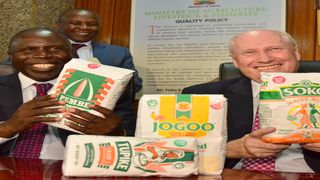
Agriculture Cabinet Secretary Willy Bett (left) and Cereal Millers Association chairman Nick Hutchinson hold up packets of maize flour during a media briefing in 2017.
| Francis Nderitu | Nation Media GroupNews
Premium
Cheap flour bill balloons by Sh400 million after ministry delays payment
Remember that cheap Sh90 packet of maize flour you bought back in 2017 after the government subsidised the cost of buying maize meal? Three years later, it has emerged that you will now foot a Sh2.3 billion bill for it after the State failed to pay millers on time despite inking a subsidy deal with them.
The maize subsidy programme that the government implemented during the 2017 drought to give affordable flour to Kenyan families has now left taxpayers with the billion-shilling bill, which is owed to eight milling companies that were engaged for the project.
The eight millers were awarded the money by arbitrator John Ohaga on December 2, 2019 as compensation for 78,000 tonnes of maize they sold to the National Cereals and Produce Board (NCPB), but which was not paid for.
And on October 15, 2020 Justice Wilfrida Okwany adopted Mr Ohaga’s award as a court order after the government failed to oppose an application by the eight millers.
The amount owed to the millers was initially Sh1.99 billion but interest has pushed the bill upwards.
Interestingly, during arbitration, the Ministry of Agriculture, Livestock and Fisheries did not file any evidence to support its claim that the government does not owe money to the millers.
Bad drought
Kenya underwent one of its worst droughts in 2016 and 2017, which led to a shortage of grain. This saw some millers push the price of maize flour, one of the country’s most consumed products, to more than Sh150 for a two-kilogramme packet.
The government first stepped in through the Kenya Revenue Authority in April, 2017 by waiving duty on all raw white maize imports from the Common Market for Eastern and Southern Africa (Comesa) zone.
By September, 2017 when local produce was expected to have stabilised, army worms had invaded maize farms, which led to an extension of the grain shortage.
Through the Ministry of Agriculture, Livestock and Fisheries, the government stepped in once again.
The ministry took over all maize imports, as it intended to sell maize to millers at subsidised prices to ensure they maintained the Sh47 and Sh90 for one- and two-kilogramme packets of flour respectively.
The National Cereals and Produce Board (NCPB), a state agency under the Agriculture ministry, was to handle the subsidy project on behalf of the government.
Regulate prices
As most private millers had already imported maize in bulk, it was difficult to regulate prices, hence the ministry resolved to buy all the maize its partnering millers had already shipped in through the NCPB.
The maize would then be resold to the same millers at subsidised prices to allow them honour the regulated flour prices.
On November 20, 2017, Alpha Grain Millers, Capwell Industries, Kabansora Millers, Karibu Millers, Kitui Flour Mills, Mombasa Maize Millers, Pembe Flour Mills and Osho Grain Millers sold a combined 78,000 tonnes of grain to government before buying it back and producing flour.
The process was done through tendering, with each of the millers submitting bids for the grain they had.
The maize was packed in 50-kilogramme bags. Each bag was sold to the government for Sh1,777.80, which brought the total bill to Sh2.7 billion.
But three years later, the government is yet to settle the millers’ dues.
Money released
On May 21, 2018 to June 12, 2018 the government released Sh700.3 million to the eight millers, leaving a Sh1.99 billion balance.
As the contract between government and millers provided for a 12 per cent annual interest rate until full payment, taxpayers will now have to pay more than Sh2.7 billion to the millers.
The debt has joined a long list of government pending bills that continue to balloon owing to interest and penalties.
On March 4, 2019 the Nairobi Centre for International Arbitration registered the dispute between the eight millers and the ministry.
Wamae & Allen Advocates told Mr Ohaga that the government sent its clients, the eight millers, an email on July 13, 2019 admitting that the money is indeed owed and that payment of all pending bills was in the pipeline.
State counsel Bernard Kuria denied that the ministry admitted liability and held that any communication between government and the eight millers was on a without-prejudice-basis.
Without-prejudice-basis in the legal world means any words traded in the particular conversation or communication cannot be used in a court of law as evidence.
Instalment evidence
Wamae & Allen Advocates added that the two instalments paid in May and June, 2018 were evidence that the claim by the eight millers is legitimate.
Capwell Industries chief financial officer Ayon Gupta told the arbitrator that the millers had met several Ministry of Agriculture, Livestock and Fisheries bureaucrats, including then CS Mwangi Kiunjuri, several times on the debt issue but payments were yet to be made.
The ministry argued that payment took long because it was reconciling figures, but the millers denied this argument and held that all figures matched.
“The respondents (Ministry of Agriculture, Livestock and Fisheries) denied that the above consignments were supplied to NCPB but did not offer any evidence to controvert the evidence tendered by the claimants (the millers). I am left with no option but to agree with the claimants that the consignments were delivered in the quantities particularised above,” Mr Ohaga said, before ordering that the ministry pay the remaining debts.
Mr Ohaga also ordered the ministry to pay the legal bills incurred by the millers in pursuing the debt.
Alpha Grain Millers, Kabansora Millers, Kitui Flour Mills, Mombasa Maize Millers and Pembe Flour Mills were also awarded different interest rates.
Mr Ohaga held that the five millers had proven that their imports were financed by interest-earning bank loans.
Interest on the five millers’ claims totals to Sh334.7 million.





